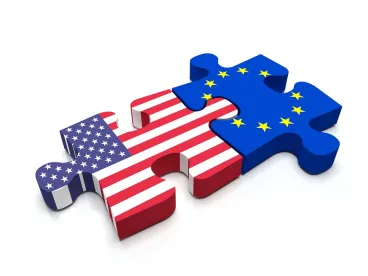Recent actions by the United States and the United Kingdom call into question their status as global leaders of multilateral trade and investment co-operation. The United States, under the Trump Administration, and the United Kingdom, following the Brexit referendum, have embraced “go it alone” policies.
The results have been dramatic. In the first few months of the Trump Administration, the United States called for the renegotiation of the North American Free Trade Agreement (NAFTA) and halted its involvement in multilateral trade and investment treaties with various countries that border the Pacific Ocean (the Trans-Pacific Partnership). The United Kingdom is currently negotiating its withdrawal from the European Union, arguably one of the most comprehensive examples of multilateral co-operation.
Both countries have challenged the benefits of multilateral trade and investment agreements, contending that they have lost far more than they have gained by being part of the multi-country approach to investment co-operation. In the place of multilateral agreements, the United States and United Kingdom are hoping to negotiate bilateral treaties that make them better able to leverage their position to get more from the partnering country.
THE IMPORTANCE OF INTERNATIONAL TRADE AND INVESTMENT TREATIES
International trade and investment treaties come in a variety of structures. From the most comprehensive, which include provisions on both investment and trade, e.g., NAFTA, to those that focus solely on investment or trade.
These treaties can also be among multiple participating countries (known as multilateral) or they can be between two countries (known as bilateral).
The various permutations of these treaties allow countries to tailor them to their specific trade and investment relationships. Their flexibility has helped fuel an explosion of such treaties over the last 50 years. There are now over 3,200 international trade and investment treaties worldwide.
Regardless of how they are structured, international trade and investment treaties are a motivating factor in an international investor’s decision on whether or not to invest in a potential cross-border project.
First, such treaties can break down trade barriers by reducing or eliminating tariffs between countries.
Second, some treaties provide legal protections to private parties against state involvement. These protections include national treatment and mostfavoured nation clauses, which require the state to offer the same or better terms to foreign investors as those offered to any domestic entity or other foreign investor. Other protections prohibit the state from expropriating the assets of a foreign investor or from violating its other commitments to the investor, sometimes referred to as an umbrella clause. Another protection is the application of a standard of fair and equitable treatment to the foreign entity’s investments.
Third, many international trade and investment treaties offer an investorstate dispute settlement mechanism that allows the investor to bring a claim directly against the state before an arbitral tribunal, often in a neutral seat. If a state violates the protections afforded to international investors under the treaty, the investor has a mechanism to recoup the cost of the harm it suffered as a result of the state’s actions. In concert, these provisions reduce risk and provide significant incentives to international investors in an effort to increase trade and investment flows between participating countries.
A multilateral approach to trade and investment treaties may offer even greater opportunities for cross-border trade and investment flow. By having multiple countries join under the umbrella of a single treaty, a multilateral trade and investment treaty opens multiple markets and creates consistency of investment and trade rules across several countries. Such a system can allow global companies with multinational supply chains to efficiently move goods, services and capital freely across borders without risk of sovereign interference, depending on the terms of the relevant treaties.
MULTILATERALISM UNDER FIRE
Despite the advantages multinational treaties offer cross-border entities, the United States and United Kingdom— once leaders in promoting multilateral trade and investment deals—have backed away from some of the most influential trade and investment agreements of the last 30 years.
In both countries, nationalist politics has brought greater scrutiny to these treaties. Some policymakers argue that multilateral trade and investment treaties threaten national sovereignty by allowing the interests of other countries and private, cross-border entities to take precedence over national interests. At the same time, certain politicians have tied these treaties to the outsourcing of domestic industries and greater immigration that allegedly erode the cultural fabric of the country. As a result, multilateralism is perceived as globalist, which flies in the face of the currently popular nationalist agenda both countries are experiencing.
The Trump Administration, in particular, views multilateral negotiations as a zerosum game, whereby one country’s loss in another country’s gain. With this in mind, the current US Government argues that multilateral treaties put the United States at a negotiating disadvantage, where it is forced to negotiate away its own interests in order to bring more countries into agreement. There doesn’t appear to be much appetite for the argument that international trade and investment agreements provide win-win scenarios where all countries benefit. The result, some argue instead, is unfavourable trade and investment treaties that do more harm than good to the US economy.
At the time of going to press, the United Kingdom has expressed no intention of voluntarily withdrawing from multilateral treaties to which it is a member, such as the Energy Charter Treaty. Until negotiations are concluded, investors will not know whether or not the United Kingdom i) will automatically cease to be a party to all or parts of investment agreements to which it was a party as a result of its EU membership, ii) must formally give notice of termination, or iii) can pursue other options. The impact of “sunset clauses” within its current agreements, which provide for the continuation of certain provisions for a certain period of time, often decades after termination, is also unclear.
BILATERALISM IN THE SPOTLIGHT
Although the United States and United Kingdom appear to be embracing bilateralism instead of multilateral trade and investment agreements, leaders in both countries still appear to believe in global trade and investment. The Trump Administration and the UK Government have both signalled that each will work on a bilateral level to promote their country’s trade and investment abroad.
They argue that bilateral treaties provide a better opportunity to extract more gains in the zero-sum game of treaty negotiation. By being able to negotiate one-on-one, the US and UK Governments believe they have better leverage. Both governments have already started eying other potential bilateral partners, including Japan, Russia, Taiwan and Vietnam.
IMPACT ON CROSS-BORDER BUSINESS
The transition from multilateral to bilateral agreements has the potential to disrupt the current international trade and investment landscape.
Several bilateral treaties in lieu of a single multilateral treaty may take longer to enact. Each treaty will likely require several rounds of negotiation, approval and ratification by a legislative authority. It may therefore take several years for new bilateral treaties to replace any multilateral treaties that have been eliminated.
Bilateral treaties may create a greater patchwork of trade and investment protections with varying mandates and provisions. If the United States and United Kingdom attempt to leverage one-on-one negotiations, investors should expect to see treaties that are highly specific to the participating countries. The greater specificity in treaties, the less integrated they are across other agreements. This has the potential to hinder efficiency and promote complexity in an already confusing landscape.
The added time and complexity brought on by bilateralism could increase the cost of conducting business across borders. Navigating and interpreting diverging trade and investment regulations, which might contradict one another, will force international businesses to greater scrutinise their international projects.
All is not lost, despite these potential new roadblocks. To avoid increased risk brought on by greater uncertainty and complexity, international investors should seek out ways to take advantage of the bilateral environment.
Investors can do this by considering a multi-tiered investment structure that leverages the benefits of a number of bilateral agreements. Although a more complicated process, investors can gain a competitive advantage by mastering the complexity and ensuring that they comply with any requirements for securing BIT protection in each relevant circumstance.
Investors also can utilise political risk insurance, which is often available in addition to BIT protection, to reduce trade and investment risks.
Through thoughtful project structuring and planning, investors can account for additional risks, notwithstanding some of the options that may disappear or be foreclosed as a result of recent US and UK policy decisions.





 />i
/>i
